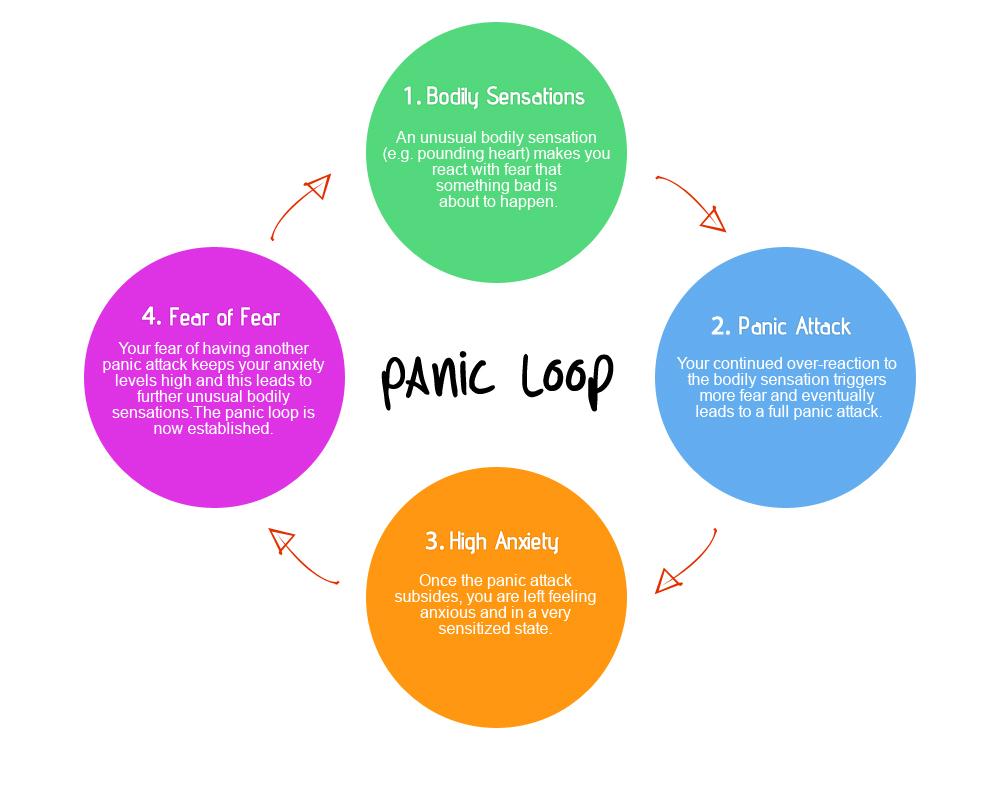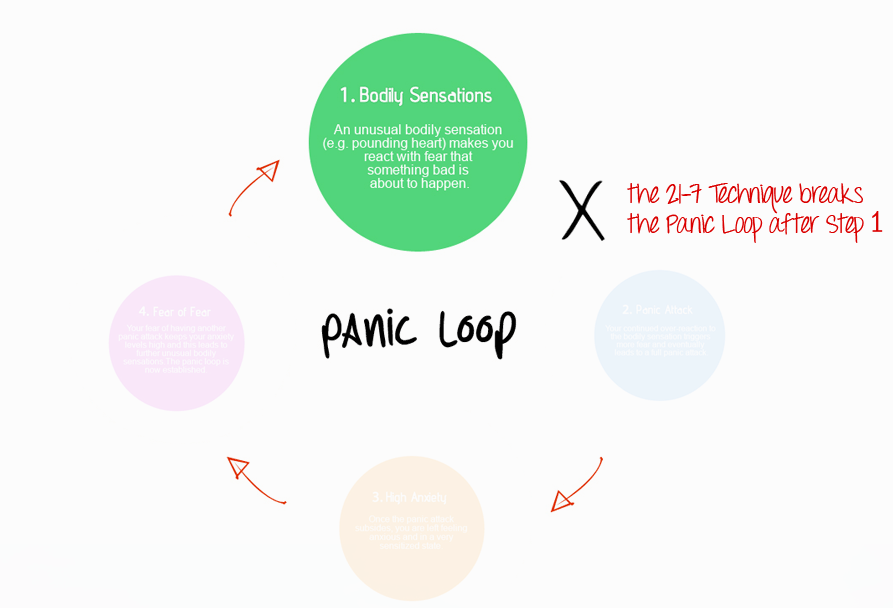Panic Attack Treatment Without Medication - How to End Panic Attacks
Here is a guide on effective panic attack treatment without medication for people who seek to end panic attacks naturally, based on proven scientific research.

Ending panic attacks requires professional, systematic treatment - but it doesn't always have to involve medication. This guide will walk you through how to treat panic attacks naturally, and at the end we'll discuss the most popular program for panic attack treatment without medication.
To understand how to treat panic attacks effectively, we have to first understand the recurring symptoms that are associated with panic disorder.
Disclaimer: This material is for informational or educational purposes only. No content is intended to be a substitute for professional medical advice, diagnosis or treatment. Consult your physician regarding the applicability of any opinions or recommendations with respect to your symptoms or medical condition. Also, this post may contain affiliate links. Please read my disclosure for more information.
The Reality of Constant Panic Attacks
Experiencing panic attacks can significantly affect your quality of life in various ways. Panic attacks can impair your ability to go to work, enjoy your day, or even leave the house, which leads to social isolation.
When a panic attacks occurs, you may feel as though you're losing control. After all, panic attacks involve a sudden episode of fear that can be quite frightening. Chest pain from anxiety and panic attacks can also feel like you're experiencing a heart attack.
Many people have just one or two panic attacks in their lifetimes, and the problem goes way, perhaps when a stressful situation ends. But dealing with panic disorder is a different story. It's a situation marked by recurrent, unexpected panic attacks as well as the dread of experiencing another panic attack.
This "fear of fear" or anticipatory anxiety is extremely disabling and leads to a constant state of worry, even in between panic attacks. Remember this idea because it's important when we talk about treating panic attacks long-term later on.
 The Panic Attack Loop - Understanding How Panic Attacks Work is Critical For Proper Treatment
The Panic Attack Loop - Understanding How Panic Attacks Work is Critical For Proper TreatmentThis panic loop demonstrates how panic attacks usually manifest (in this article we'll expand on this and how to break the loop). You can see from the above example how one incident of a panic attack can trap a person into a continuous loop of panic and anxiety. This loop can last weeks or years, depending on the help a person receives.
While a single panic attack may only last a few minutes, the effects of the experience can have a lasting impact. If you have panic disorder, the recurrent panic attacks take an emotional toll. The intense fear and terror that come with a panic attack remain in your memory, disrupting your ability to function in everyday situations.
The greatest interference to daily living is when panic disorder is paired with agoraphobia - a condition that usually appears within a year of first experiencing recurrent panic attacks.
Living a life where you're constantly on guard, waiting for the next panic attack to strike, is both frightening and exhausting.
With this background information on symptoms that occur with panic disorder, let's look at why someone would want to consider panic attack treatment without medication to combat the issue.
Why Treat Panic Attacks Without Medication?
There are many reasons why a person would want to consider treating panic attacks without medication. One key factor is the fact that many medications for anti-anxiety and panic disorder medications can have some serious side effects.
There are two types of medicines that are commonly used for panic disorder: antidepressants and benzodiazepines.
Antidepressants include Selective Serotonin Reuptake Inhibitors (SSRIs) like Zoloft, Prozac and Paxil, which are used to treat depression and anxiety by increasing levels of serotonin in the brain.
Benzodiazepines, like Xanax, Klonopin, and Valium are used to treat anxiety by triggering a tranquillizing chemical in the brain, called GABA (gamma amino butyric acid). GABA reduces brain activity in the areas of the brain responsible for memory and emotions.
While these drugs can provide temporary relief, they also come with side effects and safety concerns, some of which are quite significant.
Common Side Effects Associated with Panic Attack Medication
For example, while benzodiazepines are very effective in the short-erm, they can cause addiction and may stop working if you take them continously for more than a few months. This is because GABA neurons in your brain adjust to the presence of the drug and are underactive when it is withdrawn, leading to physical dependence and a withdrawal reaction.
The most common withdrawal symptoms are restlessness, irritability, insomnia, muscle tension, weakness, aches and pains, blurred vision and a racing heart.
The higher the dose, the more intense these side effects typically are. However, some people feel dizzy, drowsy, and uncoordinated even on low doses, which can cause problems with everyday activities such as work, school, and driving. Rarely, after use of high doses for a long time or abrupt withdrawal, a patient may suffer seizures or hallucinations.
There are also many questions about the long-term effectiveness of benzodiazepines. According to the American Academy of Family Physicians, benzodiazepines lose their therapeutic anti-anxiety effect after 4 to 6 months of regular use.
These medications are not a good choice if you've had problems with alcohol or drug use. They can also interact with other drugs, causing dangerous side effects.
Even SSRIs, which have comparatively lower risk than benzodiazepines, can lead to side effects such as nausea, insomnia, diarrhea, nervousness, emotional numbness and sexual dysfunction.
These factors are important considerations that have caused many to seek panic attack treatment without medication. While medications can ease panic attack symptoms, they're not right for everyone and they are not the only answer. There are other strategies that work just as well or better, minus the drawbacks.
How Do You Treat Panic Attacks Naturally?
While panic attacks and panic disorder benefit from professional treatment (which we'll talk about next), here are some self-care steps you can take to deal with panic attacks at home:
Practice stress management and relaxation techniques - Deep breathing techniques are commonly used to lower stress and manage panic attacks. You can also practice progressive muscle relaxation, which involves tensing one muscle at a time and then completely releasing the tension until every muscle in the body is relaxed.
Avoid smoking, alcohol and caffeine - All of these can provoke panic attacks in people are susceptible. Caffeine gives the nervous system a jolt, which can boost energy levels - but this nervous energy can also induce a panic attack. Alcohol causes a number of physiological symptoms such as dehydration, low blood sugar, and an elevated heart rate. These may make a person feel uneasy, dizzy and irritable, and may lead to a panic attack. Care should also be taken with medications that contain stimulants, such as diet pills and non-drowsy cold medications.
Get good exercise - Try to get moving for at least 30 minutes every day to relieve anxiety naturally. Aerobic activity can have a calming effect on your mood. Exercises that require moving both your arms and legs, like walking, running, swimming or dancing, can be especially effective. These activities raise endorphin and serotonin levels to help you feel better emotionally.
Connect with others - Symptoms of anxiety can be worse when you feel isolated, so reach out to people who care about you on a regular basis. Joining a support group for people with panic attacks or anxiety disorders can connect you with those who relate to the symptoms you experience.
Learn about panic and anxiety - Simply knowing more about panic can go a long way towards relieving your distress. The most effective approach to treating panic attacks starts with education about the nature of panic disorder, the causes of panic and anxiety, and the ways panic and anxiety are perpetuated by cognitive feedback loops. Learning about the sensations and feelings that occur during panic attacks can help assure you that you aren't going crazy or beyond control.
All of the above elements are helpful ways to reduce and manage panic attacks. However, the best solution to panic attacks is a treatment plan that not only educates you on panic attacks, but also teaches science-backed methods on how to end them.

The Most Effective Panic Attack Treatment Without Medication
If you're looking into a treatment program to end anxiety and panic attacks, I recommend looking into the Panic Away program by Barry Mcdonagh. The Panic Away program is a completely natural approach to ending panic and anxiety attacks and one of the most popular treatment packages available.
The program helps people tackle panic attacks and anxiety without using any kinds of drugs or supplements and has been recommended as a safe and long-term solution by more than 93% of the 70,000 people who have used it so far.
The Story Behind the Panic Away Program
Barry McDonagh, the creator of the Panic Away program, experienced his first panic attack in college. When it happened, he had no idea what it was. He had never experienced anything like it before, and it caught him completely off guard. Pounding heart, tightness in the chest, dizzy feelings - he felt it all.
For years after that initial panic attack, Barry suffered with anxiety and struggled with simple activities such as driving and being far from home.
He started looking for help to deal with his situation, but after looking into numerous programs, Barry found that most of them only showed people how to cope with anxiety. He wanted to end the problem.
Barry began developing his own approach, and found a solution that targeted the 'fear of fear' that anxiety, phobias and panic attacks generate.
He developed a program that is well rooted in Cognitive Behavioural Therapy (CBT), a recognized therapy in treating anxiety. Significant research has proven cognitive behavioural therapy to be the most effective treatment for panic attacks and panic disorder.
Why Cognitive Behavioral Therapy is So Effective
Cognitive Behavioural Therapy is one of the most common and most researched approach to mastering anxiety and conquering panic attacks.
In numerous studies, CBT has far outperformed all other psychological treatments, including anti-anxiety medication.
Cognitive Behavioural Therapy focuses on the thinking patterns and behaviours that are sustaining or triggering your panic attacks and helps you gain a more constructive perspective on your fears. CBT helps you learn, through your own experience, that panic symptoms are not dangerous.
Cognitive behavioural treatment for panic attacks and panic disorder usually uses the following interventions:
- Reframing the problem. Earlier we talked about the importance of education in treating panic attacks. Cognitive Behavioural Therapy addresses this by helping clients understand the nature of the flight-fight response experienced during a panic attack. CBT also helps clients perceive the difference between a true threat and false alarms generated by physical symptoms of anxiety.
- Relaxation training - When you suffer from panic attacks, you tend to become increasingly anxious over time, so much so that your body becomes overwrought with muscle tension, which often creates more anxiety. Relaxation training usually involves breathing training and progressive muscle relaxation training.
- CBT teaches clients to focus on deep, diagphragmatic breathing to counteract hyperventilation. What are the benefits? Decreased physiological anxious arousal, an increased sense of control, and reduced vulnerability to anxiety in the future.
- Cognitive Restructuring - Cognitive restructuring is a technique that directly targets a client's assumptions, frames and automatic thoughts about their situation and body sensations. It helps people become more aware of anxiety-provoking thought patterns and then replace them with more-balanced, less anxious thinking.
- Mindfulness - Mindfulness is a tool used in CBT to help teach people to experience unpleasant physical sensations without reacting negatively to them, thus short-circuiting the vicious cycle of fear and panic.
- Exposure - After relaxation training, mindfulness and cognitive restructuring help people feel less anxious about future panic attacks, the next step is systematic exposure. This gradual process helps people face situations they would normally avoid. Exposure treatments seem to be a key active change mechanism for panic disorder. They enable the ultimate reversal of vicious cycles around panic and avoidant anxiety.
Compared with medication, the effects of cognitive behavioural therapy last longer. Moreover, treatment is briefer in duration and is consistently proven to be more effective.
Tying it All Together - How to End Panic Attacks Without Medication
Do you remember the fourth element in the panic loop diagram above? It is the fear of another panic attack (fear of fear). This is what keeps you trapped in an anxious state of mind.
The Panic Away Program uses cognitive behavioural therapy to short-circuit the panic loop after the very first step so the panic loop is immediately broken.
At the core of Panic Away is a technique called the 21-7 Technique™. This technique teaches how to stop a panic attack in 21 seconds flat and reduce general anxiety in less than 7 minutes.
 How to Break the Panic Attack Loop
How to Break the Panic Attack LoopThis 'loop breaking' process is the key factor that makes the difference between those who fully eliminate panic attacks from their lives and those who do not.
By addressing this core problem, Barry was able to end his own anxiety and stop further panic attacks. He also began teaching others to do the same, and today his Panic Away program has gone on to become one of the world's most successful programs for ending panic and anxiety.
The program includes a detailed step by step e-book guide, online videos, audio recordings and a members' support forum with situation specific advice and encouragement.
Additionally, the program receives constant updates (once you have purchased the program, these updates come for free) based on the latest studies and research in treating anxiety and panic attacks.
When people think of treating panic attacks and anxiety, they often think of medication or therapy appointments.
The Panic Away program gives you access to expert-recommended treatment for panic attacks (at a fraction of the cost) from the comfort of your home, and you can go at your own pace.
=> Click here and scroll to the bottom of the page to get instant access to the Panic Away Program
With the right tools, you can beat anxiety and panic attacks for good, and you can do it naturally.
While medications can provide temporary relief, the best approach to dealing with panic long-term usually involves cognitive behavioral therapy. This treatment approach addresses the root cause of panic attacks, which is why many find it so effective.
Whichever path you decide to follow, make sure to do your research and make the choice that's best for you.
Related Posts:
Thanks for reading! If you liked this content, share with a friend:
Recent Articles
-
5 Best Interview Preparation Courses and Classes Online
Apr 24, 24 05:24 PM
Hoping to ace your upcoming interview? Here are the best interview preparation courses online to boost your confidence and performance. -
5 Best Media Training Courses to Prepare You for a Media Interview
Apr 10, 24 05:37 PM
Preparing for an upcoming media interview? Here are the best online media training courses to equip you with the tools you need to succeed. -
5 Best Research Methods Courses and Certificates Online (2024)
Mar 27, 24 05:06 PM
Here are the best research methods courses online that enable students and professionals to learn at their own pace and earn a certificate in research methods.



